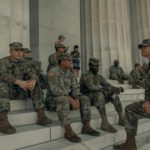 The U.S. military, which relies on a steady stream of new recruits, has struggled to meet its goals in recent years, raising concerns about its readiness in an increasingly unstable world. New research from the University of Utah suggests that immigrants may be an underused source of potential soldiers. According to a study of survey data, immigrants in both the U.S. and Canada are more willing to serve in the military than people born in those countries.
The U.S. military, which relies on a steady stream of new recruits, has struggled to meet its goals in recent years, raising concerns about its readiness in an increasingly unstable world. New research from the University of Utah suggests that immigrants may be an underused source of potential soldiers. According to a study of survey data, immigrants in both the U.S. and Canada are more willing to serve in the military than people born in those countries.
The researchers argue that this group offers a promising opportunity. “There’s growing evidence that immigrants are eager to contribute, and we should be focusing more on recruiting them.”
Willing to serve
This willingness to serve is linked to a deep commitment to their adopted countries. “Immigrants may feel a stronger attachment to the U.S. than people think,” the researchers explain. “Many are willing to defend the values and opportunities they’ve found here.”
This finding runs counter to the harsh anti-immigrant rhetoric from some political figures, like Donald Trump and J.D. Vance, who portray immigrants as a burden. In reality, many immigrants want to serve, and more effort could be made to channel their enthusiasm into military service.
Meanwhile, native-born Americans are showing less interest in joining the armed forces, which could undermine military strength. “We used to see a broader range of Americans eager to serve, but that’s declining,” the researchers note. “Immigrants are now one of the strongest sources of support for military service.”
The shrinking size of American families may be a factor. “When families have fewer kids, parents are less willing to see them serve in the military,” the study explains. “Every indicator is going in the wrong direction, except immigrant willingness to serve. So, it doesn’t make sense to restrict immigration at a time like this.”
A shrinking force
The U.S. military employs about 1.3 million active-duty personnel, or 2 million when including reservists—about 1% of the adult population. But this number is shrinking as recruitment continues to fall short of targets, raising questions about the future of the all-volunteer force.
The study also examined Canadian immigrants and found similar trends. Both the U.S. and Canada are aging, multi-ethnic democracies that rely on volunteer militaries. Immigrants make up 14% of the U.S. population and 23% of Canada’s, and in the U.S., around 8,000 non-citizens enlist in the military each year. Thousands have gained citizenship by serving.
The researchers used data from the World Values Survey, focusing on over 6,000 respondents from the U.S. and Canada. Immigrants from countries such as China, Mexico, and the Philippines were significantly more likely to say they would serve in the military compared to native-born citizens.
Defending values
However, immigrants aren’t motivated by blind loyalty. They are more likely to serve in conflicts they see as defending key values, such as fighting terrorism, rather than wars between countries.
Though the study highlights important trends, it has limitations. The survey questions were set by others, so more research is needed to confirm these findings. “We need to follow up with focus groups and interviews to understand what’s driving immigrant willingness to serve,” the researchers say.
As recruitment continues to struggle, it may be time to reconsider the role of immigration in national defense. Immigrants could help fill the gap, both strengthening the military and challenging negative stereotypes.